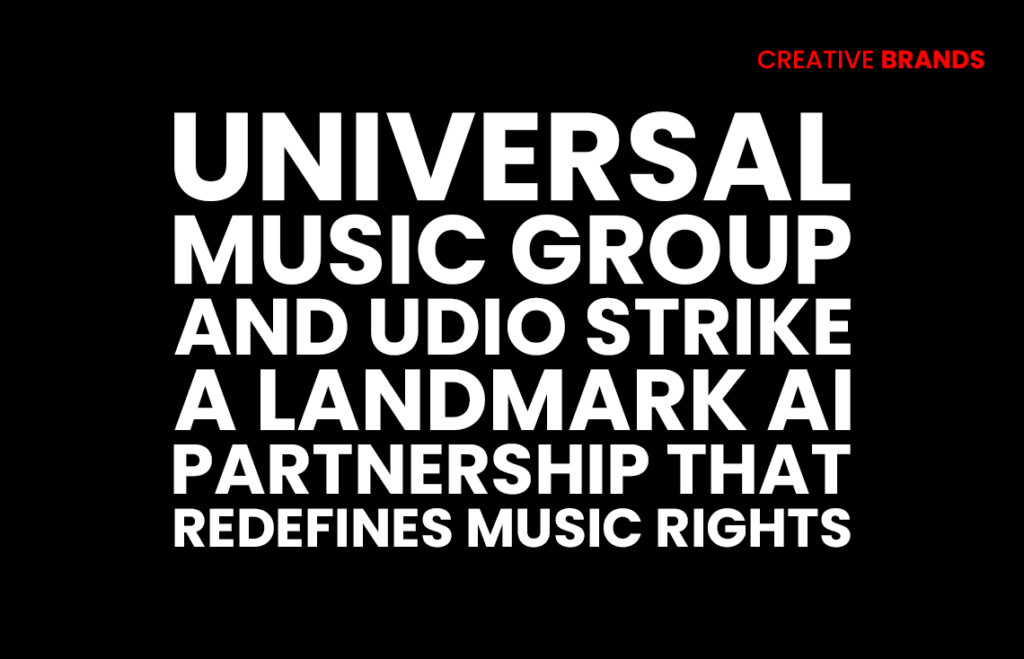Universal Music Group’s partnership with AI platform Udio sets a new benchmark for ethical AI in music. Udio will train its models only on licensed recordings, using accurate metadata to ensure fair royalties and transparency. The collaboration redefines AI-generated music as rights-safe, revenue-generating, and creator-respecting innovation for the industry’s future.

In a move that could reshape the future of AI-generated music, Universal Music Group (UMG) has partnered with AI music platform Udio to create a rights-safe model for artificial intelligence in the music industry. The collaboration marks a significant shift in how technology companies and record labels work together—placing licensing, metadata, and artist rights at the center of the AI revolution.
This is not another story of tech disruption pitted against creative ownership. Instead, it’s a story about cooperation, control, and compensation. For the first time, an AI platform will train its systems exclusively on authorized recordings, ensuring that every artist and rights holder is accounted for from the start.
Licensing Before Learning
Udio’s partnership with UMG stands out for one crucial reason: it’s licensed. Unlike many AI models that have faced backlash for using copyrighted material without permission, Udio’s training process will rely solely on legally approved content from Universal’s extensive catalog. That means every sample, chord, and lyric the system learns from is used with full consent.
This licensing-first approach represents a milestone for the music industry, which has spent much of 2024 and 2025 grappling with the implications of generative AI. Artists and labels have expressed growing concern about unlicensed AI music models that can mimic voices, styles, and production techniques without credit or compensation.
UMG’s collaboration with Udio flips that narrative. Instead of fighting AI, it’s about shaping it responsibly.
Metadata as the New Infrastructure
At the core of this partnership lies an often-overlooked element: metadata. In the age of AI, metadata is becoming the backbone of both transparency and fair monetization. It tells the story behind every song—who wrote it, who performed it, who owns it, and how revenue should flow.
By building an AI system grounded in clean, accurate, and linked metadata, Udio and UMG are setting a precedent for how AI-generated music can function within the existing rights ecosystem. When every digital file is traceable and every contributor is identified, royalties can be distributed fairly, and innovation doesn’t have to come at the expense of creators.
As one industry insider put it, “Metadata isn’t admin anymore—it’s infrastructure.”
The partnership underscores a growing realization within music and tech circles: data quality determines value. Without clear ownership data, AI models can’t respect licenses or pay out royalties. With it, they can become engines of growth for artists, publishers, and labels alike.
A New Revenue Logic for the AI Era
Beyond its technical and ethical implications, the UMG-Udio partnership introduces a new business logic to the music industry. When AI-generated outputs are properly licensed and tagged, they don’t just avoid controversy—they create new income streams.
Every AI-assisted track, remix, or composition that emerges from this ecosystem can generate royalties for the original rights holders. That means the future of AI music could be less about replacement and more about collaboration—where human creativity and machine learning coexist in a shared economic framework.
For artists and songwriters, that could translate into fresh opportunities for exposure and earnings. For record labels, it offers a way to monetize their vast catalogs in innovative new formats. And for tech companies, it provides a legal and ethical blueprint for building with music data responsibly.
Redefining the Relationship Between AI and Art
Universal Music Group has been vocal about the need to protect artists from unauthorized AI cloning and misuse. Earlier this year, the company removed its catalog from certain streaming and social platforms that allowed AI training without consent. This new partnership signals that UMG is not anti-AI—it’s pro-ethical AI.
Udio, meanwhile, gains credibility and access to one of the world’s most valuable collections of music. Together, they’re demonstrating how artificial intelligence can enhance, not exploit, creative ecosystems.
Their collaboration could also pave the way for an industry-wide standard: AI models trained on verified metadata and licensed content, governed by transparent contracts and automated royalty systems.
The Metadata Moment
The music industry has long struggled with incomplete or inconsistent metadata. From uncredited session musicians to missing songwriter data, these gaps have historically led to lost royalties and disputes. In the AI age, those gaps become even riskier—unidentified data can lead to unlicensed use and legal grey areas.
That’s why this moment matters. The UMG-Udio alliance is effectively turning metadata management into a form of digital ethics. It’s not just about organizing information—it’s about ensuring justice, transparency, and sustainability in a landscape that’s being rewritten by algorithms.
In this framework, clean metadata doesn’t just help artists get paid—it empowers the entire creative chain to participate in AI’s potential.
A Blueprint for the Future
This collaboration could mark the beginning of a broader movement across the entertainment world. Other rights organizations, publishers, and tech platforms are likely to watch closely as UMG and Udio roll out their system. If successful, it could serve as a model for integrating AI into creative industries without undermining the rights of the people behind the work.
The message is clear: innovation and integrity don’t have to be at odds. When licensing, metadata, and fair compensation are built into AI systems from the start, the technology becomes a tool for collaboration rather than conflict.
A Turning Point
UMG and Udio’s partnership may well be remembered as the moment when the music industry stopped fighting AI and started defining it. It shows that artificial intelligence can respect human artistry, provided the systems behind it are designed with transparency, consent, and accurate data at their core.
In an era where machines can compose, remix, and replicate at lightning speed, this new chapter offers a hopeful refrain: that music’s future doesn’t belong to algorithms alone—it belongs to the people who teach them to listen.







